It was Keirin and Sprint legend Koichi Nakano’s birthday the other day; at 65 years-old he’s the same age as me. His huge claim to fame is that he won 10 consecutive World Professional Sprint titles. Mention of his name got me to thinking that he didn’t really win those titles straight and to find out more we spoke to Gordon Singleton of Canada…
Leicester, England 1982, the World Professional Sprint Championship, Japan’s Keirin King and Pro Sprint phenomenon Koichi Nakano – he’d eventually win the title ten years in a row – has been declassed in the first heat of the final against Singleton.
Singleton has the form of his life; he’s already bested reigning World Keirin Champion, Danny Clark to earn the rainbow jersey in that discipline.
With the Nakano DQ the Canadian is one ride up, if he wins the next ride he’s a double world champion – but just as the two are going to the line again it’s announced that Nakano’s DQ decision has been overturned and the heat is to be re-run.
No matter, Singleton takes the heat; he’s one up – one ride away from his second rainbow jersey of the week.
Into the home straight and it looks very much as if the man with the maple leaf on his jersey has the better of the Japanese rider.
But what happened next is still the topic of bar room debate amongst track racing pundits like me some 30 years later.
An innocent collision – or did Nakano deliberately deck the man who looked to be on the way to divesting the Jaguar-driving Keirin millionaire of his rainbow jersey?
Gordon Singleton will give us his take in this interview; but what is unarguable was how hard the Canadian hit the Leicester boards – it was the sound of some massive tree crashing to the forest floor.
Singleton’s shoulder was separated, he couldn’t ride another heat and the title was Nakano’s.
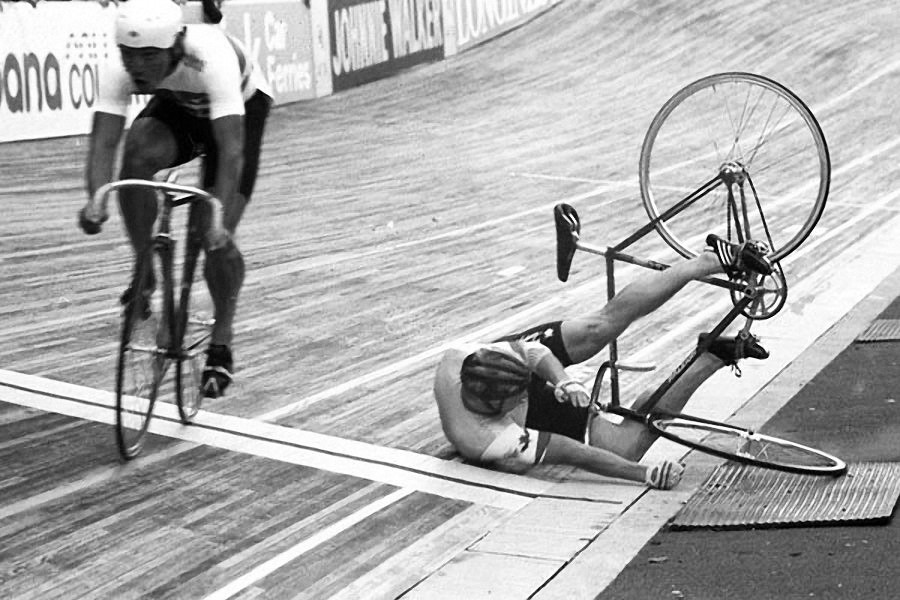
The Japanese rider’s victory bow to the crowd which earlier in proceedings was met with applause from the big crowd didn’t go down so well this time round; we all knew that the day belonged to Singleton, and so did Nakano.
We caught up with Singleton a while ago and he gave freely of his time to tell us about a career which saw him take various world records and win multiple Commonwealth and World titles.
How did you get into cycling, Gordon?
“I was introduced to bike racing in the spring of 1974 through the St. Catharines Cycling Club; Karen Strong who was a Worlds ladies Pursuit medallist and Steve Bauer were also members in that era although Steve was a couple of years younger than me.
“A guy called Peter Junek was also a member – he came to Canada from Czechoslovakia in 1968 he had raced over there but went on to become one of the world’s premier velodrome builders.
“I was 17 years-old, Peter looked at me and said; ‘I think he can be a sprinter’ – Peter and Colin Hearth from the club took me to the 250m metre concrete track in Toronto and I came away as the Junior Provincial Champion.
“As the season unfolded I won a few junior road races – if I was there at the end I was going to win the sprint.
“My parents were from Warrington in England and when I finished high school in the spring of 1975 I said to them that I’d like to go to England and take cycling seriously.
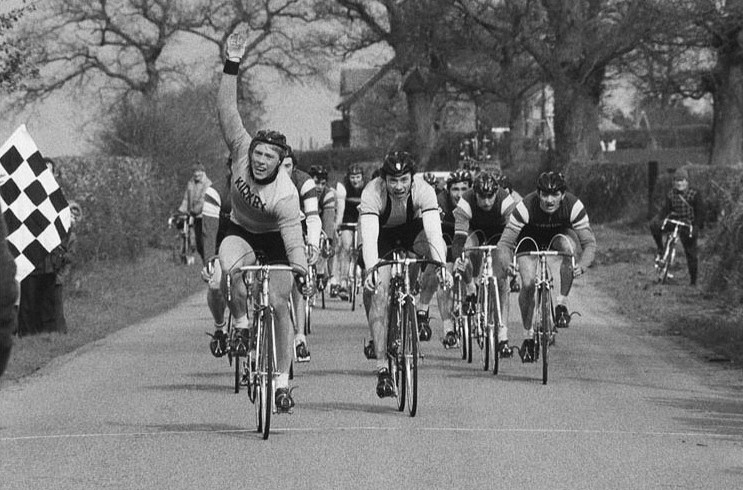
“In North West England there were tracks in Manchester and Liverpool and you could race a couple of times each week.
“I’d ordered a Harry Quinn track frame before I travelled to England and when I went over to Liverpool I visited the shop to see how they were doing with my frame.
“When I was in Quinn’s shop, Eddie Soens (legendary English coach/mentor – Chris Boardman was one of his charges) came in and we got to talking, one thing lead to another, he decided to work with me and the rest is history.”
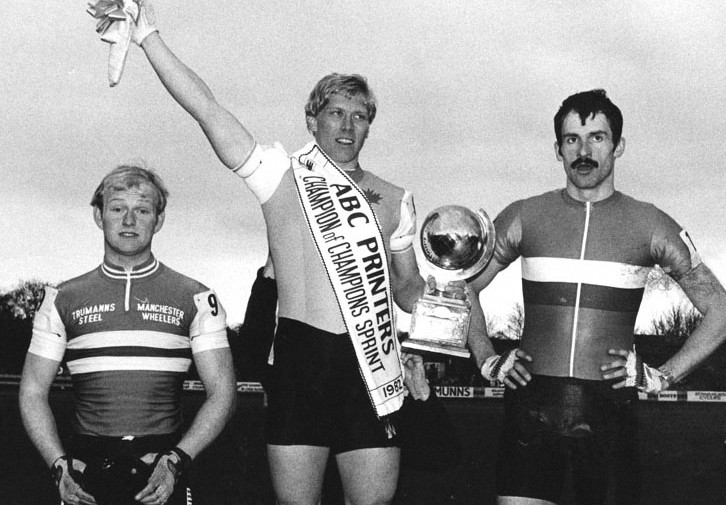
What was your first taste of international competition?
“The 1975 Worlds in Liege. I’d just turned 19 – I lost the first round ride then I lost the repechage!
“But before the Worlds, Eddie had said to me; ‘Don’t be shocked by how good they are!’ and that had prepared me for the experience.”
That was a golden era for Canadian track cycling with you, the late Jocelyn Lovell and Curt Harnett.
“Jocelyn came first, his career was coming to an end as mine was beginning and Curt came along just after me so careers weren’t really together but we all belonged to a generation where you had to do it yourself with no help or support from government or sports foundations – those days are gone.
“No one does it now how we did it.”
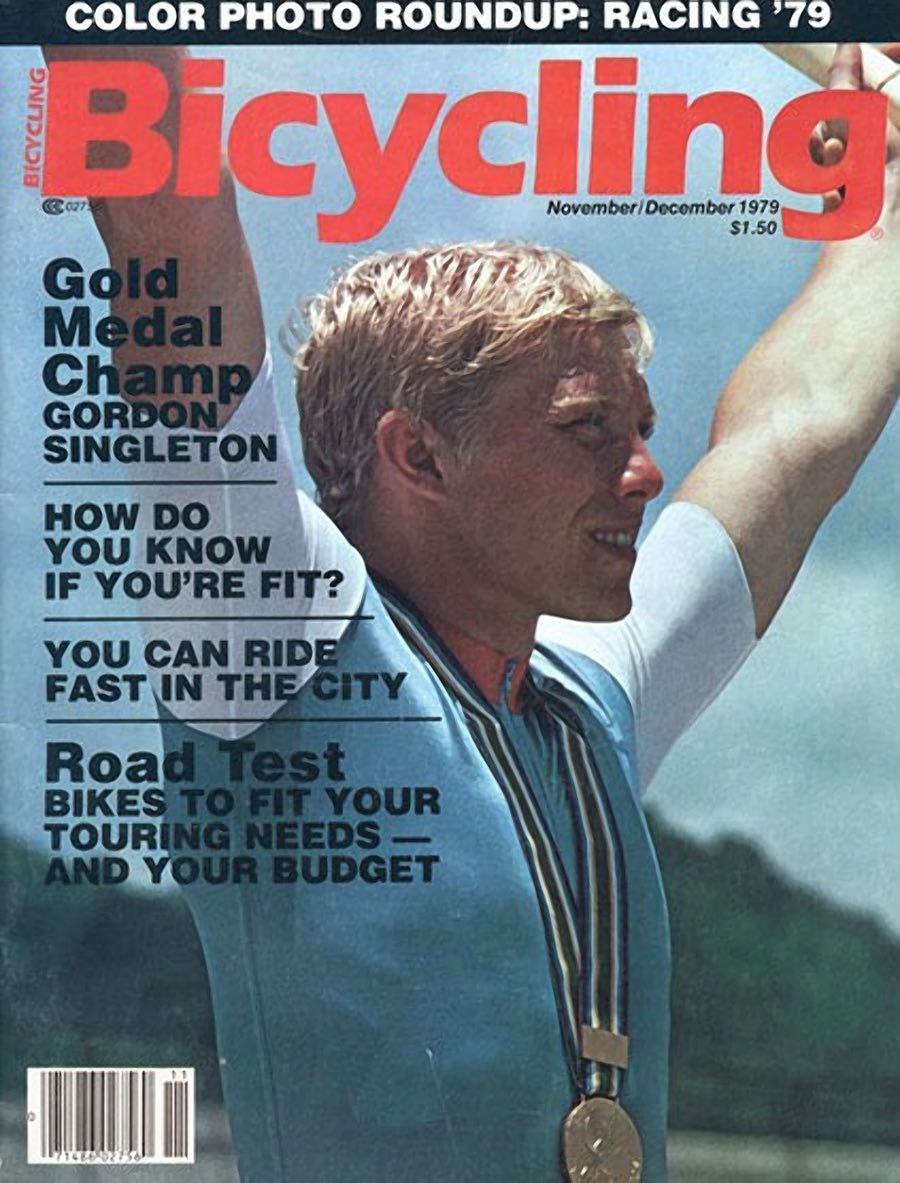
Which of your performances as an amateur are you most proud of?
“There are three or four but I think that when I broke three world records in Mexico in 1980, that was special.
“Canada had boycotted the Moscow Olympics and that was a big disappointment for me so I thought that I had to do something to compensate.
“I was racing at Trexlertown in the USA at the time and said to Eddie; ‘I’d like to go for the world 200 metres record in Mexico.’
“Eddie said; ‘no, we’ll go to Mexico and we’ll break the 200, 500 and 1000 metre records !’
“That was Eddie; he always wanted more, better.
“So we went and accomplished the goal, breaking all three records. They’d all been held by the French rider Pierre Trentin with 10.69; 27.85 and 1.03.9 – I did 10.58, 27.31 and 1.03.8 respectively.
“I was watching the Wiggins hour record ride the other day – he’s in a packed stadium with all that support behind him – and I thought back to or day in Mexico – a Tuesday at 10:00am.
“There was me, Eddie and Norman Sheil; we paid for the two UCI timekeepers and the doctor for the dope test to attend and that was it – over the passage of time it gets lost how simple and basic our approach was back then.”
Why turn pro?
“I was kinda ticked off at not getting to the Moscow Games and there was no guarantee that the same wouldn’t happen for LA in ’84 with the way things were with the Olympic Movement.
“With hindsight it wasn’t a good decision – I was offered a contract by a company called AMF who had a strong team with riders like Connie Carpenter and Davis Phinney.
“They offered me a contract to endorse their product line and said they’d pay me $1:00 per bicycle sold. The previous year they’d had Bruce Jenner (the Olympic athlete) in the role and they had sold 400,000 bikes … $400,000 was huge money back then.
“I had a sports contract lawyer who worked with the ice hockey pros check out the paperwork and I signed up with AMF – six months later they hadn’t sold a single bike!
“But I was a ‘professional’ because I’d signed the contract.”
Tell us about your relationship with Eddie Soens.
“He had an incredible ability to visualise the potential within an athlete and extract that talent from him.
“He did with a lot of guys, not just me. We’d give 110% for him; he was inspiring.”
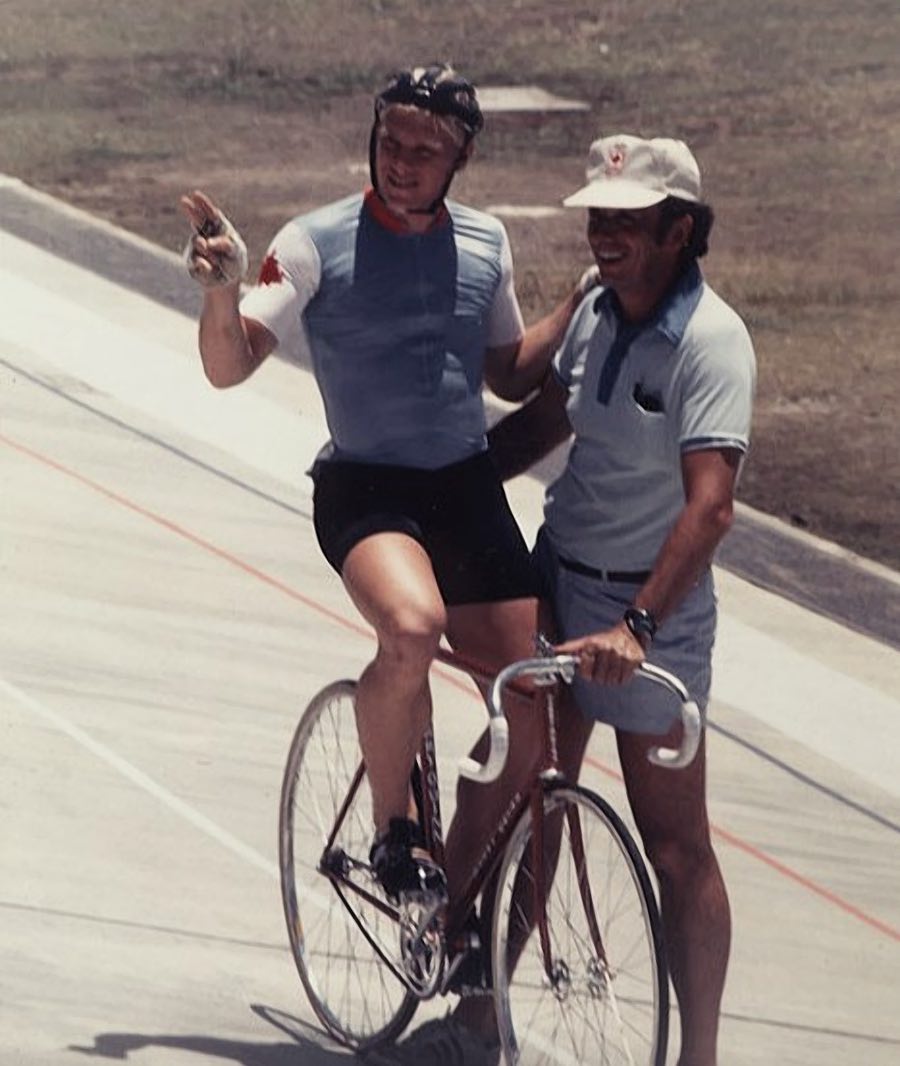
You rode for Eddie Soens and Ken Matthews Kirkby CC in Liverpool at the height of their deadly rivalry with the Liverpool Mercury CC.
“Ken managed the club and drove me to races; I was proud to be a member of the Kirkby and very humble to be accepted by the Liverpool fraternity – I made friends for life during that period.
“And if you look at the period from the 50’s to the 70’s it was Eddie Soens who was behind most of that talent that emerged from Merseyside.
“Although Pete Matthews, Phil Thomas and Terry Dolan as Mercury guys would probably disagree!
“I used to train on the road with Kirkby guys like John Clewarth and Kevin Apter – very talented riders; some of those criteriums in Liverpool when it was Kirkby versus Mercury used to get a little bit ‘heated’, you might say.”
It’s a shame that your career is perhaps defined by the ‘Nakano incident’ rather than your Keirin world title or world records but what’s your take on that day?
“It’s been discussed many times and Nakano will have his take but if you watch the video on my website (gordonsingleton.com) you can make your own mind up.
“Canadian TV were filming me because if I won they had me lined up to be a new TV sports star.
“But the travesty wasn’t so much Nakano as the way the race was officiated.
“Nakano was DQ-ed in the first ride of the final but his guys protested and just as we were going to line for the second ride it was announced that the decision had been annulled and we had to re-run the heat.
“How could that be? – he was either DQ-ed or he wasn’t but it was as if the first heat hadn’t happened.
“I won the next ride fair and square to go one ride up; then in the second ride there was contact, he came under my shoulder and took me off.
“My shoulder was separated and although we got it back in we decided that I shouldn’t ride the next heat – although maybe with the adrenalin coursing through my body, I could have.
“But that was the decision we made; Nakano had a ‘ride over’ in the last heat and he was the champion, again.
“That was my last big race and the one people remember me for…
“The postscript is that I attended the 2008 Worlds at Manchester Velodrome and was given an ‘access all areas’ pass by British Cycling – which was nice of them.
“I was in the track centre and there was Nakano, the first time I’d seen him in 28 years, there was a language barrier but we did that ‘pro athlete’s hug thing’ and it gave me closure, at last.
“But you know, at the Worlds in Amsterdam in 1979 a high ranking British UCI figure told my manager, Norman Sheil, ‘we’ll never give a decision in favour of any of your riders, Norman.’”
[Sheil was twice World Amateur Pursuit Champion and subsequently British track coach but emigrated to Canada where he coached the national track squad, ed.]
“And the day before the sprint final I was approached by Jan Derksen who was the man who decided who rode what Six Day and dished out the contracts – he offered me 16 contracts but I tuned them down.
“There were guys who would have cut off their right arm for 10 contracts, never mind 16; Derksen was gobsmacked, I don’t think he could believe that I’d turned him down.
“And many of the commissaires at Leicester were involved in the Six Day scene…”
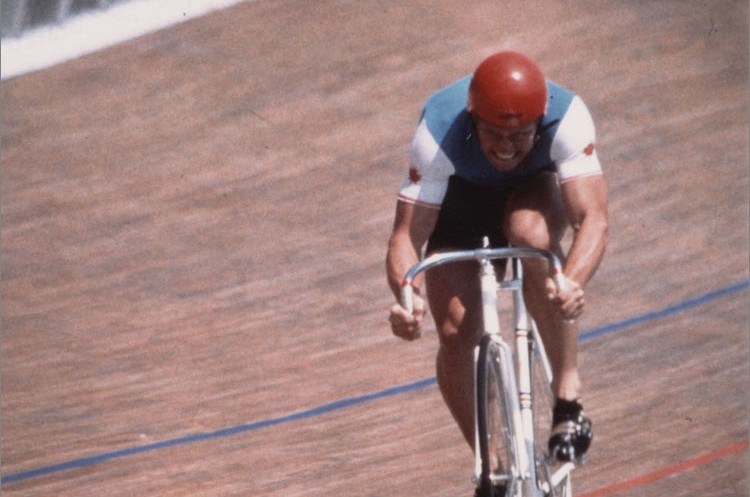
But being World Keirin Champion must have been some consolation?
“When I was a kid in Canada the 1974 world Professional Road Race Championships were held in Montreal so a bunch of us got a train to Montreal from Niagara to watch.
“Merckx beat Poulidor to win and I saw Eddy get his rainbow jersey, I clearly remember thinking; ‘I gotta get me one of those!’
“And when Eddie Soens asked me who I wanted to be on the bike, I said; ‘I want to be fastest sprinter in the world.’
“So I got my rainbow jersey and my world records.”
You were World Champ, why quit?
“In ’81 I was second to Nakano in the Worlds in Brno but I made a tactical error in that I sat after the semis, – where I rode 10.8 sitting up, which was probably worth 10.6 – and thought about the final.
“As Eddie said, I went’ ‘off the boil’ and couldn’t do 11.2 against Nakano because I’d over-thought it all.
“At Leicester, after I’d won my semi-final, I went out on my road bike around the city for 40 minutes and that got my mind away from the track, I got a sweat on and arrived back at the track just in time for the final.
“But after Brno my dad had said to me; ‘are you going to come and work in the family automotive tyre business?’
“I said that I would if I won the world title in ’82 – I won the Keirin and besides I was on £1500 per year from Raleigh as a pro with a £500 win bonus for the Worlds – it was hardly ‘big money.’
“I got my jersey so decided to step up to the plate and join the ‘real world’ – which wasn’t easy to start with, those retail customers don’t care if you’ve been a world champion, they just want their job done.”
What about track racing now, the mega gears?
“It’s taken me a few years to get my head around sprinters on 115” plus gears, that’s for sure!
“I was at the new velodrome in Canada that’s been built for the Pan Am Games which take place here, this year and I was chatting to the guys on the track team – which was a real thrill – I was telling them that we used to ride 88” or 92” for the big events and if you were racing some big old concrete outdoor track in Paris or Copenhagen which had been built with motor pacing in mind and there was a 20 mph headwind in the back straight, it was just totally different to being on an air conditioned indoor 250 metre board track.
“But in 1977 and 1978 I was ninth in the Worlds both years and then I met this fella who spoke to me about the benefits of a 12 month per year weight training regime.
“I took that up and in ’79 I was beating guys easily who previously I couldn’t get to their back wheel and I took the Kilometre silver at the Worlds in Amsterdam.
“I think at that time if the riders and coaches had understood that we were getting stronger then we could have gone up to 94” or 96” gears.
“But the thing with these monster gears is that the youngsters hear about them and are on them before they’ve learned to pedal – back in my era there would be a 10 Mile Scratch Race to close a track meeting and we were covering the distance in 19 minutes, on 88” gears – and they’re not that much quicker today.”
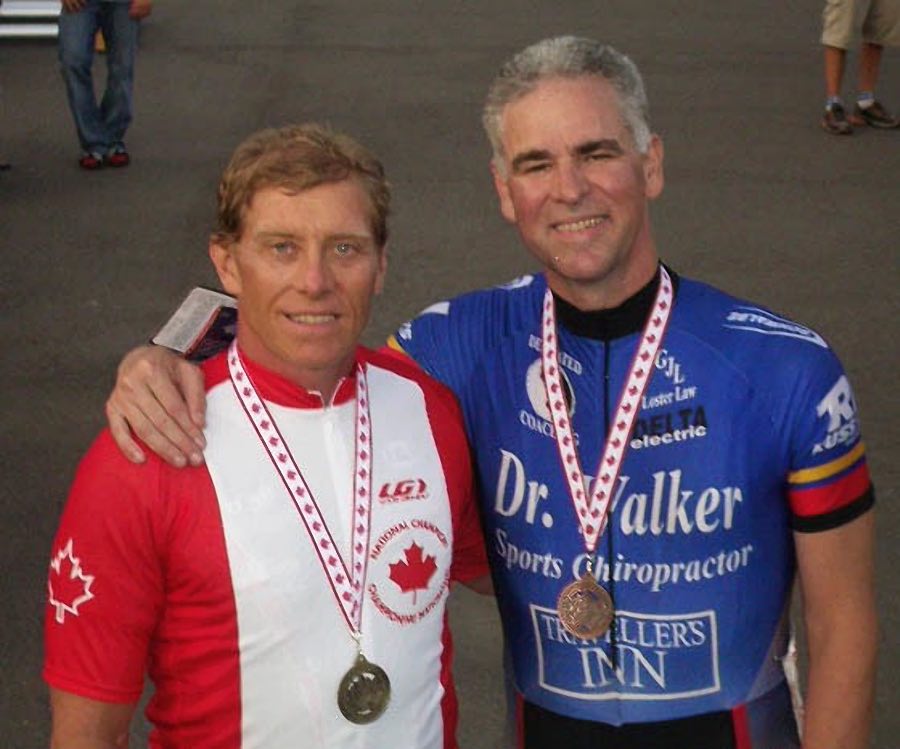
Regrets?
“I’ve made a lot of great friends all over the world and what I learned as an athlete, to train work hard and be dedicated, I’ve tried to apply in my business life.
“Signing that AMF contract wasn’t a good move because it denied me the ’84 Olympics in LA; the Olympics are a big deal in Canada and there’s no doubt that the Media largely switched off to me when I went pro.
“But I had a great career, when I was at the top organisers would fly me round the world to ride their races and I’d stay in nice hotels – that’s why those first couple of years in retail were difficult with folks tearing a strip off you if they’re not happy.
“But my dad started the business in 1957 and we’re still here; I think all business is a battle but it supports my family – and I can afford to buy a new bike when I feel like it!”



